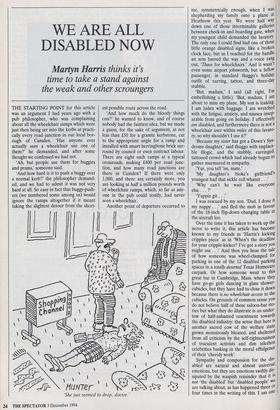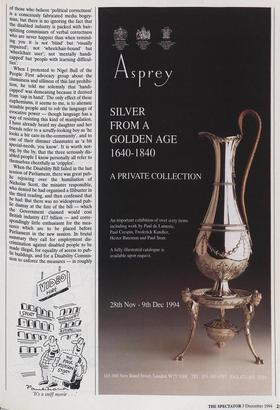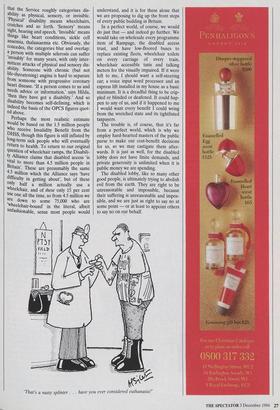WE ARE ALL DISABLED NOW
Marlyn Harris thinks it's
time to take a stand against the weak and other scroungers
THE STARTING POINT for this article was an argument I had years ago with a pub philosopher, who was complaining about all the wheelchair ramps which were just then being set into the kerbs at practi- cally every road junction in our local bor- ough of Camden. 'Has anyone ever actually seen a wheelchair use one of them?' he demanded, and after some thought we confessed we had not.
`Ah, but people use them for buggies and prams,' someone said.
'And how hard is it to push a buggy over a normal kerb?' the philosopher demand- ed, and we had to admit it was not very hard at all. So easy in fact that buggy-push- ers (we numbered some among us) would ignore the ramps altogether if it meant taking the slightest detour from the short- est possible route across the road.
'And how much do the bloody things cost?' he wanted to know, and of course nobody had the faintest idea, but we made a guess, for the sake of argument, at not less than £50 for a granite kerbstone, cut to the appropriate angle for a ramp and installed with smart herringbone brick sur- round by council or even contract labour. There are eight such ramps at a typical crossroads, making £400 per road junc- tion, and how many road junctions are there in Camden? If there were only 1,000, and there are. certainly more, you are looking at half a million pounds worth of wheelchair ramps, which, so far as any- one in the pub could testify, had never seen a wheelchair.
Another point of departure occurred to 'She just seemed to drop, doctor.' me, symmetrically enough, when I was shepherding my family onto a plane at Heathrow this year. We were half way down one of those interminable galleries between check-in and boarding gate, when my youngest child demanded the lavatorY. The only one I could find had one of those little orange disabled signs, like a broken clock face, but as I reached for the handle an arm barred the way and a voice rang out, `Thass for wheelchairs.' And it wasn't even some airport jobsworth, but a fellow passenger, in standard thuggo's holiday outfit of earring, tattoo, and three-day stubble.
'But, madam,' I said (all right, I'm embellishing a little). 'But, madam, I am about to miss my plane. My son is leaking• I am laden with baggage. I am wretched with the fatigue, anxiety, and nausea insep- arable from going on holiday. I effectivelY am disabled, and furthermore there is not a wheelchair user within miles of this lavato- ry, so why shouldn't I use it?'
'Because my sister has got a Down's Syn- drome daughter,' said thuggo with implaca- ble illogic, and the stubbly, earringed, tattooed crowd which had already begun to gather murmured in sympathy.
'Yur, you tell 'im, mate.' 'My daughter's bloke's girlfriend's youngest had that sickle cell whatsit . . 'Why can't he wait like everyone else . . ?'
'Yuppie git . . 1 was rescued by my son. 'Dad, I done it my nappy. .' and fled the mob in favour of the 18-inch flip-down changing table In the aircraft loo.
Over the time it has taken to work up the nerve to write it, this article has become known to my friends as 'Harris's kicking cripples piece' as in 'When's the deadline for your cripple-kicker? I've got a story you might use . . .' And then you hear the tale of how someone was wheel-clamped for parking in one of the 12 disabled parking spaces in a totally deserted Texas Homecare carpark. Or how someone went to this great bar in Cambridge, Mass. where they have go-go girls dancing in glass shovver- cubicles, but they have had to close it down because there is no wheelchair access to the cubicles. On grounds of common sense you do not believe half of these saloon-bar sto- ries but what they do illustrate is an under- tow of half-ashamed resentment towards the disabled industry: the sense that here is another sacred cow of the welfare state grown monstrously bloated, and sheltered from all criticism by the self-righteousness of truculent activists and dim telethon celebrities basking in the moral effulgence of their `cheridy work'.
Sympathy and compassion for the dis- abled are natural and almost universal emotions, but they are emotions swiftly dis- sipated by the waspish reminder that it is not 'the disabled' but 'disabled people' we are talking about, as has happened three or four times in the writing of this. I am one of those who believe 'political correctness' is a consciously fabricated media bogey- man, but there is no ignoring the fact that the disabled industry is packed with hair- splitting commissars of verbal correctness who are never happier than when remind- ing you it is not 'blind' but 'visually unpaired'; not 'wheelchair-bound' but 'wheelchair user'; not 'mentally handi- capped' but 'people with learning difficul- ties'.
When I protested to Nigel Bull of the People First advocacy group about the clumsiness and silliness of this last prohibi- tion, he told me solemnly that 'handi- capped' was demeaning because it derived from 'cap in hand'. The only effect of these euphemisms, it seems to me, is to alienate sensible people and to rob the language of evocative power — though language has a way of resisting this kind of manipulation. I have already heard my daughter and her friends refer to a scruffy-looking boy as 'he looks a bit care-in-the-community', and to one of their dimmer classmates as 'a bit special-needs, you know'. It is worth not- ing, by the by, that the three seriously dis- abled people I know personally all refer to themselves cheerfully as 'cripples'. When the Disability Bill failed in the last session of Parliament, there was great pub- lic rejoicing over the humiliation of Nicholas Scott, the minister responsible, who denied he had organised a filibuster in the third reading, and then confessed that he had. But there was no widespread pub- lic dismay at the fate of the bill — which the Government claimed would cost British industry £17 billion — and cone- sPondingly little enthusiasm for the mea- sures which are to be placed before Parliament in the new session. In brutal summary they call for employment dis- crimination against disabled people to be made illegal, for equality of access to pub-
lic buildings, and for a Disability Commis- si°n to enforce the measures — in roughly
'It's a sniff movie . . the same way as the Commission for Racial Equality enforces the Race Relations Act.
Supporters of the legislation claim to be campaigning on behalf of an impressively large tranche of the population, but how many disabled people are there exactly? The 'registered disabled' figures only seem to be compiled locally, and are not much help in any case, as the criteria vary se wildly from one local authority to another. In my home town of Swansea, for instance, virtually anyone with a 'doctor's note' can get a disabled parking permit or 'Anabl' as it is known in the land of officialese Welsh. In my family, 'Anabls' are passed promiscu- ously from car to car as need arises: 'I'm just popping down to Marks for some bridge-rolls and cocktail sausages. Now who's got the Anabl?' The result is that the currency has become devalued and orange Anabl bearers outnumber able-bodied drivers in the battle for parking spaces behind the Kardomah.
Lorna Reith of the Disability Alliance told me, 'The figure we go on is 6.5 million, which is based on the OPCS 1981 census. The Policy Studies Institute put the figure a bit higher, at 6.9 million.' The Alliance also estimates that there are 1 million peo- ple with 'significant visual impairment' and another 7 million who are 'said to have a hearing impairment'. So we are up to 15 million and counting in what is clearly a country of the crippled where only multiple impairment is king. As usual it is a measure of charitable virility to get the estimate of your client base as high as possible: any lobby which can brandish 15 million votes will have a politician's attention, but with definitions so elastic as to embrace a fifth of the population there is also the risk of cheapening the vocabulary and sliding into meaninglessness.
In search of some definition of disability, which does not extend from quadriplegia at one end to tonsillitis at the other, I moved on to Hilda Bailey of the Disability Infor- mation and Advice Service. She told me that the Service roughly categorises dis- ability as physical, sensory, or invisible. 'Physical' disability means wheelchairs, crutches and so forth. `Sensory' means Sight, hearing and speech. `Invisible' means things like heart conditions, sickle cell anaemia, thalassaemia etc. Obviously, she concedes, the categories blur and overlap: a person with multiple sclerosis can suffer `invisibly' for many years, with only inter- mittent attacks of physical and sensory dis- ability. Someone with chronic (but not life-threatening) angina is hard to separate from someone with progressive coronary heart disease. If a person comes to us and needs advice or information,' says Hilda, `then they have got a disability.' And so disability becomes self-defining, which is indeed the basis of the OPCS figures quot- ed above.
Perhaps the most realistic estimate would be based on the 1.5 million people Who receive Invalidity Benefit from the DHSS, though this figure is still inflated by long-term sick people who will eventually return to health. To return to our original question of wheelchair ramps, the Disabili- ty Alliance claims that disabled access Is vital to more than 4.5 million people in Britain'. These are presumably the same 4.5 million which the Alliance says 'have difficulty in getting about', but of these only half a million actually use a Wheelchair, and of these only 15 per cent use one all the time, so from 4.5 million we are down to some 75,000 who are 'Wheelchair bound' in the literal, albeit unfashionable, sense most people would understand, and it is for these alone that we are proposing to dig up the front steps of every public building in Britain.
In a perfect world, of course, we would do just that — and indeed go further. We would take on wholesale every programme item of Rampage, the disabled access trust, and have low-floored buses to replace existing fleets, wheelchair toilets on every carriage of every train, wheelchair accessible taxis and talking meters for the visually impaired. If it were left to me, I should want a self-steering car; a voice input word processor and an express lift installed in my house as a basic minimum. It is a dreadful thing to be crip- pled or blinded or deafened. It could hap- pen to any of us, and if it happened to me I would want every benefit I could wring from the wretched state and its tightfisted taxpayers.
The trouble is, of course, that it's far from a perfect world, which is why we employ hard-hearted masters of the public purse to make our cost-benefit decisions for us, so we may castigate them after- wards. It is just as well, for the disabled lobby does not have finite demands, and private generosity is unlimited when it is public money we are spending. The disabled lobby, like so many other good people, is ultimately trying to abolish evil from the earth. They are right to be unreasonable and impossible, because their suffering is unreasonable and impos- sible, and we are just as right to say no at some point — or at least to appoint others to say no on our behalf.
'That's a nasty splinter . . . have you ever considered euthanasia?'













































































 Previous page
Previous page